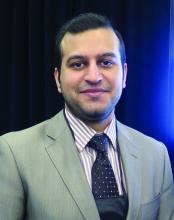LOS ANGELES – After a simple educational initiative was implemented, the proportion of internal medicine residents who discussed the topic of overweight and obesity with patients improved from 17% to 69%, results from a single center have demonstrated.
“Everybody knows about the obesity epidemic, but nobody’s talking about it,” Hassan Mehmood, MD, said in an interview at the annual scientific and clinical congress of the American Association of Clinical Endocrinologists. “They’re not doing enough to treat obesity. The United States Preventive Services Task Force [USPSTF] recommends screening all adults over the age of 18 years for obesity.”
In an effort to determine how often internal medicine residents are discussing obesity with patients, Dr. Mehmood and colleagues retrospectively reviewed the medical charts of 301 adults with a body mass index of 30 kg/m2 or greater who were seen at Temple University/Conemaugh Memorial Medical Center in Johnstown, Pa., between May and June of 2018. They recorded the total number of problems addressed, type of visit, whether obesity was discussed, and the resources used by the residents and attendings for management.
Between July and December of 2018, residents received education through lectures and conferences on obesity screening and management tools. The educational initiative included placement of posters in the clinic about obesity, and all physicians were encouraged to schedule separate visits to discuss the topic with patients. To evaluate the effects of the initiative, the researchers collected data on 255 adults with a BMI of 30 or greater who were seen in the clinic between May and June of 2018.
The mean age of patients in the study sample was between 40 and 50 years, 61% were women, and 91% of the office visits were for follow-up. The patients’ average BMI was 38, they had an average of two comorbidities, and residents most often addressed five diagnoses. From preintervention to postintervention, the researchers observed a statistically significant improvement in the frequency with which residents addressed general health maintenance with patients (from 62% to 83%; P less than .0005) and obesity (from 17% to 69%; P less than .0005). The discussions around obesity included talking about lifestyle modification, medication management, or bariatric surgical intervention.
Before the intervention, many residents reported not being aware of the USPSTF recommendations to screen all patients aged 18 years or older for obesity. They also felt pinched for time during office visits.
“They have only 30 minutes for treatment of chronic problems, so they didn’t find time to talk about obesity,” said Dr. Mehmood, who is a third-year resident at the medical center. “If residents don’t find time for talking about obesity, they can ask patients to return for a separate visit to talk about obesity and give management options to patients. Patients should know what their BMI is so that they can discuss it with their physician.”
He acknowledged that few patients are comfortable talking about their weight, and he suggested starting the conversation by asking “How do you feel about your weight?” during office visits. “That is the best question you can ask,” he said. “[It] helps open the conversation.”
Dr Mehmood reported having no financial disclosures.

